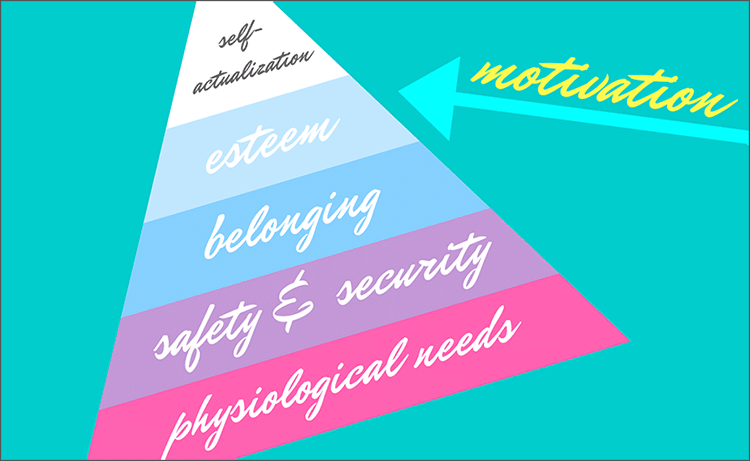
Common sense tells us that motivation is easy. If someone does something good, give them a reward. A financial incentive, for example. Then they’ll be motivated to keep doing that good thing.
If only that were true. Psychologists have looked at motivation from every angle and keep coming back to one fact: incentives don’t work. Neither do punishments. If you want to motivate yourself or your employees, you need to look beyond conventional wisdom.
The Danger of Motivational Rewards
Money is almost never a good long-term motivator.
Yes, money is incredibly important. On its own, it isn’t necessarily a source of happiness, true enough. But people dealing with debt or financial insecurity suffer more stress, pain and mental illness than people who are financially secure. So by saying “money is a poor motivator,” no one is suggesting you shouldn’t pay your employees.
In fact, paying them well is a great idea. When someone doesn’t have enough money, ill health and high stress levels impact their productivity. More than that, the logistics of trying to survive on too little can be very distracting. Some believe that people are driven to work harder if they’re hungry, but in reality, hunger (literal or metaphorical) will take a toll on anyone’s ability to focus on work.
Once someone makes enough money that they can stop thinking about it all the time, they’ll be more able to focus. That doesn’t solve the problem of motivation, though.
Researchers have found that we can’t actually make people work harder by tying their performance directly to financial rewards. Really. Bonuses can make employees feel appreciated, but those are indirect rewards. Direct rewards like spiffs, incentive plans or commission-based payment structures are more troublesome. They can work in certain circumstances. They can work up to a point. But take care, because they can also leech away the one type of motivation that really matters: intrinsic motivation.
Money, incentives and the threat of punishment create extrinsic motivation — motivation generated by an external factor outside an individual’s control. Intrinsic motivation comes from within. Studies have shown again and again that you can cultivate extrinsic motivation in yourself or others to encourage temporary compliance, but it has a cost: it diminishes intrinsic motivation, potentially permanently.
What does that look like in practice? Take a sales agent working on commission. A commission-based payment structure encourages an agent to maximize their paycheck, which seems like good motivation. Ideally, they perform to high levels in the process. But if someone’s only motivated by their paycheck, what happens when they can make more by doing something that doesn’t benefit your company or your customers?
History and research both tell us that employees who are purely driven by incentives will follow higher commissions into unethical territory. The most famous example comes from the early 1990s. Sears Auto Centers suffered a devastating loss when it was discovered that their mechanics were pushing unnecessary repairs on customers. Why did they do it? Because they were encouraged with a faulty incentive structure.
And demanding employees meet unrealistic goals can make the results much worse. In 2016, we learned that Wells Fargo employees had opened as many as 3.5 million fake bank accounts in the names of real people. They’d committed fraud on a mind-boggling scale. Why? Because their quotas unintentionally created a work culture where that was acceptable. Expected, even. This wasn’t just a few bad seeds — over 5000 employees were fired for the practice, supervisors and all.
Psychology teaches us that the behavior of those Wells Fargo employees could have been anticipated. Goal setting as a motivating force can backfire spectacularly, especially when the goals aren’t practically obtainable. Faced with an impossible goal, people change the rules (which is when unethical behavior becomes more palatable), or they give up. Quotas and other numerical goals are also extrinsic motivators, after all, and extrinsic motivation only takes us so far.
When it melts away, there had better be something underneath.
Motivation Without Tangible Rewards
Even knowing that they can backfire, financial incentives and quotas are tempting motivational strategies. They’re relatively easy to manage at both a corporate and personal level. If a list of milestone goals alone could keep us building our businesses and striving for success, life would be a lot easier.
But for long-term success, we’re better off relying on intrinsic motivation. Yes, it’s more complicated. It isn’t controlled by trackable metrics. But unlike extrinsic motivation, it sticks around through good times and bad.
In 2010, author Daniel Pink gave a talk that showed the world how motivation and drive really work. His points are backed by research that holds true today.
Pink identifies three factors that motivate all of us: Autonomy, Mastery and Purpose. Concentrating on these three factors will do more to build motivation than a financial reward ever could.
Autonomy is independence. It’s the feeling of having some ownership over our work.
Mastery is improvement. It’s the feeling of getting better at a skill or in a role.
Purpose is a cause. It’s the feeling that our work has meaning beyond basic profit or survival.
When an employee finds a more efficient workflow than the one they were trained in — and they’re allowed or encouraged to make use of it — they’re exercising autonomy.
When you take a chance by offering a new type of tour and it’s a success, you feel the warm glow of mastery.
When a customer leaves a review explaining how your business brought them joy or made their life better, you might find a sense of purpose.
On the other hand, when an employee’s every decision is taken away by someone else’s micromanagement, they lose autonomy. If you never take the chance to try anything that might not succeed, there’s no opportunity for mastery. When everything you do feeds into increasing your business’s profits without any other considerations, you don’t allow yourself purpose.
To remain motivated in the long term, you have to create conditions for those three factors to shine through.
When Intrinsic Motivation Fails
What if you have a sense of purpose, have autonomy in your work, are constantly improving yourself, and you still can’t stay motivated?
Most likely, some of your other fundamental needs are being neglected.
Back in 1943, psychologist Abraham Maslow proposed a hierarchy of human needs. At the bottom, the very base of everything, are physiological needs. Things like food, water, and sleep form the foundation for our existence. Up from there is safety: shelter, personal security, financial security and so on. Social belonging is next: friendship, intimacy, acceptance from our peers.
Each tier is harder to achieve without the support of the ones below it, so if you aren’t able to meet those fundamental needs, motivation may be more challenging to find. Only with all of them accounted for can we truly focus on the upper tiers: Esteem, Self-Actualization, and Self-Transcendence. Those are where autonomy, mastery, and purpose come in.
That’s not to say your life has to be perfect before you’ll find motivation, just that serious deficits in any of those areas can be disruptive, as can physical or mental illness. One way to approach the problem is by building a routine that lets you take care of yourself. If you’re not sure where to start, our self-care tips for entrepreneurs can help.
Creating Motivation That Lasts
Anything you can do to cultivate autonomy, mastery, and purpose will likely have a positive impact on your employees’ motivation or your own. Here are a few tried and tested ideas:
- Mix up your methods. When you always do the same things in the same way, you limit opportunities for growth. Encourage yourself or your employees to find new ways of doing things. Push for efficiency or expansion, but not to a quota. Trust yourself to recognize improvement when you see it.
- Find opportunities to learn. New information is ridiculously rewarding from a psychological perspective. Anytime you can bring learning into your work, you give yourself a reason to take a genuine interest.
- Set goals. We know that arbitrary or overwhelming goals set by someone else are disastrous for motivation, but that’s not the only kind of goal there is. Start each day or week with one practical, measurable goal you can achieve. Long-term goals are good, too, but they lack the motivational power of seeing your achievements come together day by day.
- Get creative. Carve a block of time out of your regular schedule for unstructured creativity. If you have employees, pick one day a month to encourage them to try new things, walk new paths (literal or figurative), and take a break from rigid productivity.
Moving beyond flawed reward-based systems of motivation can free you to truly love what you do. We all have bad days, but the knowledge that you’re working on your own terms and for your own benefit can be a powerful antidote.







